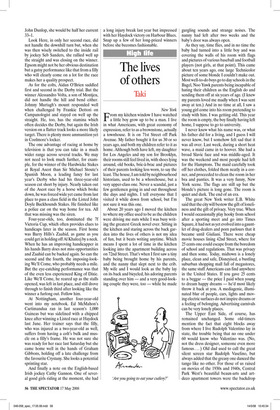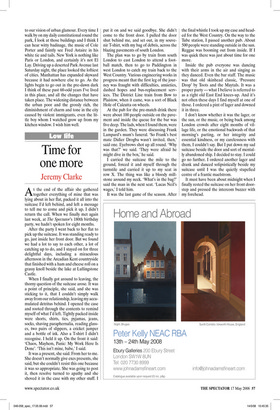The lives of others
Taki
New York From my kitchen window I have watched a little boy grow up to be a man. I live in what Americans, with great economy of expression, refer to as a brownstone, actually a townhouse. It is on 71st Street off Park Avenue. My father bought it for us 30 or so years ago, and both my children refer to it as home. Although both have left, my daughter for Los Angeles and my son for Brooklyn, their rooms still feel lived in, with shoes lying around, old books, bric-à-brac and pictures of their parents looking less worn, to say the least. The house, I am told by neighbourhood historians, used to be a whorehouse, but a very upper-class one. Never a scandal, just a few gentlemen going in and out throughout the days and nights. I tell everyone that I visited it while down from school, but I’m not sure it was this one.
About 20 years ago I moved the kitchen to where my office used to be as the children were driving me nuts while I was busy writing the greatest Greek novel ever. Sitting in the kitchen and staring across the back garden into the lives of others is not my idea of fun, but it beats writing anytime. Which means I spent a lot of time in the kitchen looking into the apartment building across on 72nd Street. That’s when I first saw a tiny baby being brought home by his parents, and the nanny that slept next to the crib. My wife and I would look as the baby lay on its back and bicycled, his adoring parents standing over him — and a very good-looking couple they were, too — while he made gurgling sounds and strange noises. The nanny had left after two weeks and the baby’s door was always open.
As they say, time flies, and in no time the baby had turned into a little boy and was covering the walls of his room with flags and pictures of various baseball and football players (not girls, at that point). This came about ten years ago, one large Technicolor picture of some blonde I couldn’t make out. Most well-to-do boys go to day schools in the Bagel, Noo Yawk parents being incapable of hating their children as the English do and sending them off at six years of age. (I knew my parents loved me madly when I was sent away at ten.) And in no time at all, I saw a young girl come into his room pretending to study with him. I was getting old. This year the room is empty, the boy finally having left home, I suppose to go to university.
I never knew what his name was, or what his father did for a living, and I guess I will never know, but I somehow felt sad that it was all over. Last week, during a short heat wave, a maid came in to hoover. She had a broad Slavic face and was middle-aged. It was the weekend and most people had left for the Hamptons. The maid carefully took off her clothes, folded them neatly in a corner, and proceeded to clean the room in her bra and panties. It was a very funny, New York scene. The flags are still up but the blonde’s picture is long gone. The room is quiet and dark. The end of an era.
The great New York writer E.B. White said that the city will bestow the gift of loneliness and the gift of privacy. Very true. When I would occasionally play hooky from school after a sporting meet and go into Times Square, it had not as yet evolved into a gauntlet of drug-dealers and porn parlours that it became until Giuliani. There were cheap movie houses lining 42nd Street, where for 25 cents one could escape from the boredom of school and regulations. That was privacy and then some. Today, midtown is a lonely place, clean and safe, Disneyised, a bustling suburban shopping mall full of megastores, the same stuff Americans can find anywhere in the United States. If you gave 25 cents to a beggar — the price I paid when young to dream happy dreams — he’d most likely throw it back at you. A mediagenic, illuminated blur of people, cars, lights and moving electric surfaces do not inspire dreams or a feeling of belonging. Advertising carnivals can be very lonely places.
The Upper East Side, of course, has remained unchanged. Some old-timers mention the fact that eight blocks away from where I live Rudolph Valentino lay in state, the trouble being that no one under 60 would know who Valentino was. (No, not the dress designer, someone even more famous ... ) Old dad used to call the great silent screen star Rudolph Vaselino, but always added that the greasy one danced the tango like no other. For those of us raised on movies of the 1930s and 1940s, Central Park West’s beautiful beaux-arts and artdeco apartment towers were the backdrop to our vision of urban glamour. Every time I walk by on my daily constitutional round the park, I look at those buildings and I think I can hear witty badinage, the music of Cole Porter and faintly see Fred Astaire in his white tie and tails. New York is nothing like Paris or London, and certainly it’s not El Lay. Driving up a deserted Park Avenue last Saturday night, the place looked the loftiest of cities. Manhattan has expanded skyward because it had nowhere else to go. As the lights begin to go out in the pre-dawn dark I think of these past 60-odd years I’ve lived in this place, and all the changes that have taken place. The widening distance between the urban poor and the grossly rich, the diminishment of charm and tone in the city caused by violent immigrants, even the little boy whom I watched grow up from my kitchen window. I wish him well.











































































 Previous page
Previous page